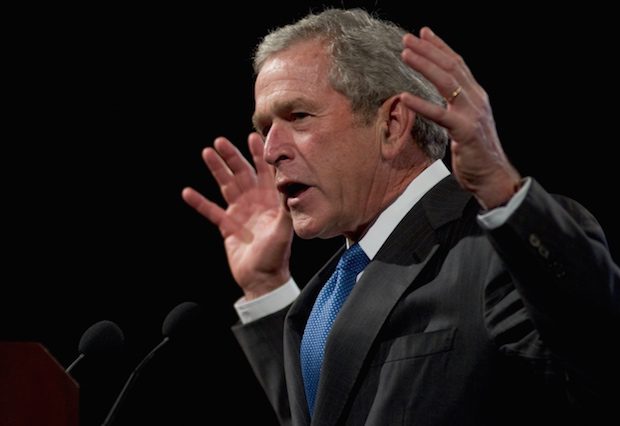Spare Us the Folly of Another ‘Freedom Agenda’

Noah Rothman wants a new “freedom agenda”:
From Turkey to Egypt, from Russia to China, the Obama White House has chosen a wait-and-see approach to civil unrest amid a crackdown on dissent. The Obama administration reasons that, in these moments of great social flux, it is incumbent on them to keep a low profile lest they provide these embattled repressive regimes a scapegoat. The merits to this argument are difficult to separate from mythology. No administration pursues a recklessly antagonistic foreign policy without complications abroad. So, too, is it impossible for any White House to conduct U.S. foreign affairs divorced from the nation’s founding principles [bold mine-DL]. The export of liberal republican ideals is central not only to America’s self-conception but to its security.
The administration correctly refrained from inserting itself into Iran’s election protests, but seems to have drawn the wrong lesson that it should have “done more” to express support for the protesters. That was contrary to what the Green movement’s leaders wanted, and would have done them no good, but why let that get in the way of a good talking point? The U.S. often simply can’t influence political disputes inside other states in a constructive way, and even if it could it is usually wrong to try.
It requires a very short memory to say that Obama has always taken a “wait-and-see approach” to foreign protest movements. In the years immediately following the Iranian protests, Obama was remarkably quick to come down on the side of protesters in Egypt and rebels in Libya, and made his ill-considered declaration that Assad “must go.” That was the part of Obama’s presidency when we were treated to all sorts of high-minded claptrap about being on the “right side of history” and how we were obliged to take sides in foreign civil wars because that was “who we are” as Americans. There was a burst of Wilsonian foolishness in 2011 and 2012 in the U.S. response to the so-called “Arab Spring” that yielded generally awful results: an unnecessary war in Libya producing chaos and instability in the region, false encouragement for Syrian rebels, and upheaval in Egypt. Given these poor results, why would anyone want to do more of the same meddling?
If we want to appeal to “the nation’s founding principles” in foreign policy debates, we don’t get to pretend that having the government export political ideals was part of our foreign policy in the early days of the United States. The first generations of Americans may have hoped that other nations would follow our example, and they would have been sympathetic to attempts to do so, but that didn’t extend to interfering in the politics of other states. Non-interference in the affairs of other nations was one of the principles that the U.S. used to take very seriously, and it is one that is incompatible with efforts to try to “shape” the internal politics of other countries. U.S. foreign policy has been divorced from that principle for many decades, and it is hard to see how it has made the U.S. freer or more secure. The U.S. and the world have been very poorly served by its “sense of mission” in the world, and the less lip service the next president pays to it the better off we will all be.
Comments